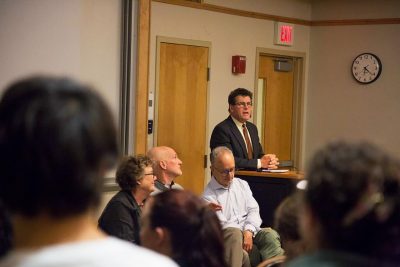
In the week following the election of Donald Trump as the 45th president of the United States, Boston University organized a wide variety of discussions, panels and lectures to help the community reflect on the election and understand what a Trump presidency means.
A primary discussion, held Nov. 10 in the College of General Studies, consisted of a series of short presentations by faculty panelists across a range of disciplines, followed by an open question-and-answer session.
In addition to this campus-wide meeting, other smaller events throughout the week targeted more specific questions that the community had about the election result, including its impact on foreign policy.
BU spokesperson Colin Riley said the university put forward the series of meetings because of the unpredictable nature of the election.
“What you’re seeing is a consequence of an unexpected result that caused a lot of confusion when the expectations of the pollsters and the media did not materialize,” Riley said. “Fortunately, we have a lot of experts, people who can look deeper, to explain and help people better understand and facilitate a positive discussion about what it means.”
It’s common for BU to host post-election discussions, Riley said. The university’s hope is that these discussions can foster collaboration among different ideologies, he said.
“[These events provide] the opportunity for people to get together, communicate, hear from others and maybe understand things that they didn’t before,” Riley said. “It’s a healthy environment.”
BU President Robert Brown sent an email to the student body Nov. 9 in response to the election. Not only did he address the shock factor of the campaign, he also addressed the potential problems that arise from the nature of the new president-elect specifically.
“We have been witness to one of the most extraordinary presidential elections in our nation’s history,” Brown wrote. “Some in our community will celebrate the outcome. Many are very disappointed. Many also are deeply anxious because of the corrosive and disrespectful statements about women, racial and ethnic groups, religions, and nations made during the campaign.”
Many students made use of these outlets and resources BU provided in the wake of the election, but not everyone thought these discussions were called-for.
Nicholas Fuentes, a freshman in the College of Arts and Sciences and a Trump supporter, said BU’s sponsorship of the events in reaction to the election results showed liberal bias by the university.
“Does anybody believe for a moment that the same accommodations would be offered had Hillary Clinton won? Of course not.” Fuentes said. “This is only the latest example of the extreme and obvious liberal bias that prevails on college campuses.”
Although he disagreed with the university’s decision to host post-election events, Fuentes said he hopes to see collaboration as the community moves forward from the election.
“We have to come together as a nation, and our liberal friends have to give Trump a chance,” Fuentes said. “Through dialogue, through communication, we can have a government that works for all of the American people, I have faith that this will be the case under Trump.”
Madeleine Arch, a sophomore in the College of Fine Arts, said even if BU’s reaction to the election was biased, it was only matching the ideology of the student body.
“It’s good that [BU is] supporting the students, considering we have a hyper-liberalism atmosphere at BU,” Arch said. “You really can’t be offended when BU wants to protect the majority over a small minority of people.”
Many students did utilize and appreciate the resources BU offered — Laura Diaz, a sophomore in CGS, said that she was disheartened by the results of the election, but looks forward to seeing how BU students and faculty think about this election season.
“Personally, I don’t know what’s going happen with this presidency; I don’t know what’s in store for the future,” Diaz said after the Nov. 10 discussion. “I just wanted some of the professors’ insights on what they thought, to hear more perspectives and more opinions on the matter.”
Diaz said others should also make sure their voice are heard.
“The world isn’t over. There’s still hope and no one should just give up; we can definitely still fight and push back,” Diaz said. “Don’t just sit down and let it all happen. Be a part of it, do something against what you don’t agree with.”


















































































































